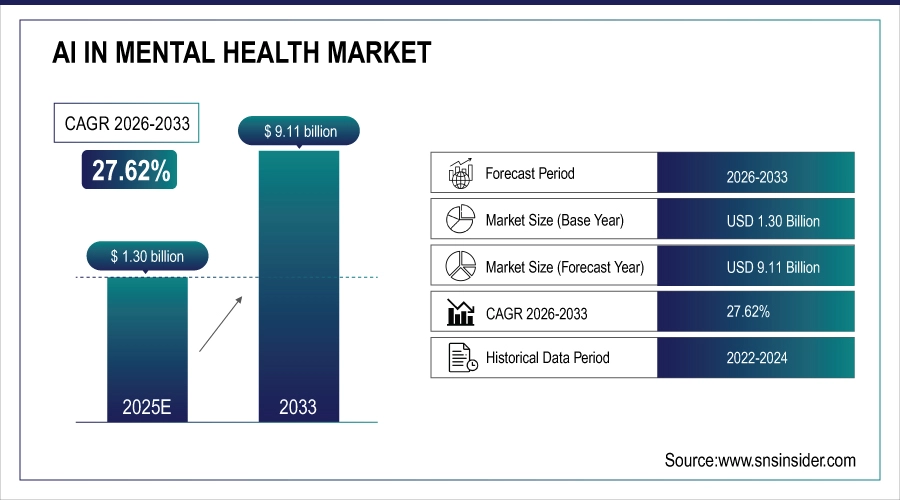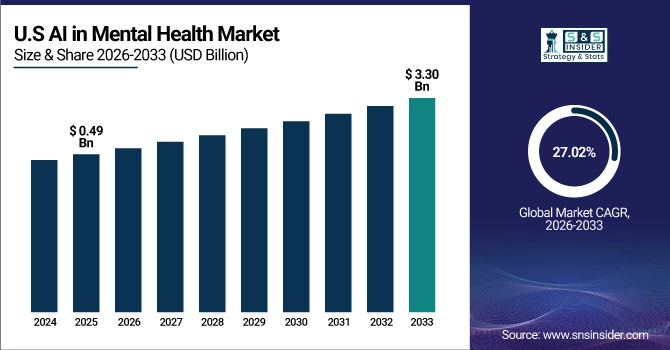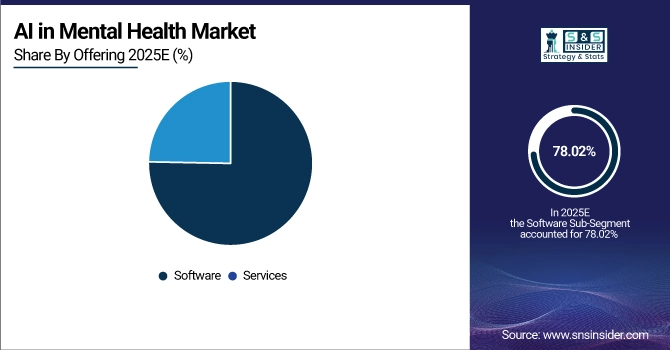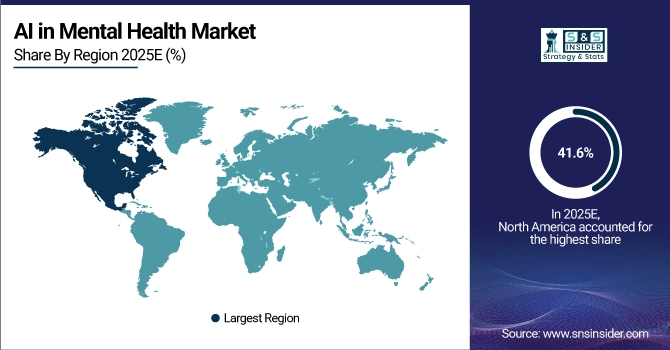AI in Mental Health Market Report Size Analysis:
The AI in mental health Market size was valued at USD 1.30 billion in 2025E and is expected to reach USD 9.11 billion by 2033, growing at a CAGR of 27.62% over the forecast period of 2026-2033.
The global AI in the mental health market is growing fast as a result of growing awareness about mental health, heightened demand for accessible treatment, and advancements in technology. AI-powered solutions, such as chatbots, predictive analytics, and virtual therapists, are transforming diagnosis, monitoring, and treatment. With growing investments and needs arising on telehealth platforms, expansion is in progress in health care, corporate wellness, and education.
Market Size and Forecast:
- Market Size in 2025E: USD 1.30 Billion
- Market Size by 2033: USD 9.11 Billion
- CAGR: 27.62% from 2026 to 2033
- Base Year: 2025
- Forecast Period: 2026–2033
- Historical Data: 2022–2024

To Get more information on AI in mental health Market - Request Free Sample Report
The U.S. AI in mental health market size was valued at USD 0.49 billion in 2025 and is expected to reach USD 3.30 billion by 2033, growing at a CAGR of 27.02% over the forecast period of 2026-2033.
The U.S. dominated North America in the AI in mental health market, owing to the density of the advanced healthcare sector, significant investments by venture capital funds in AI technologies, and the presence of several large AI in mental health companies, such as Google, Microsoft, and IBM, in the United States. For instance, the U.S. Department of Veterans Affairs uses AI technologies to offer mental health support to thousands of veterans, pointing out an important impetus to mental health care (U.S. Department of Veterans Affairs 2019).
In 2025, the Trump Administration, just taking office, repealed the Biden Administration’s Order on AI (American Psychological Association). It subsequently introduced a new executive order aimed at eliminating barriers to innovation and reinforcing the country’s position as a global leader in AI.

AI in Mental Health Market Dynamics:
Drivers:
-
Rising Prevalence of Mental Health Disorders Driving the Market Growth
The growing population is suffering from mental health disorders such as anxiety, depression, PTSD, and insomnia globally. This spike can be attributed to factors such as fast life, economic, and social isolation pressures. Some form of mental disorder affects approximately 1 in 8 people globally, according to the World Health Organization. The increasing ubiquity of the problem also makes it urgent to find solutions that are easily accessible, empirically validated, and scalable. Chatbots and virtual therapists powered by AI can deliver timely support and interventions to large swathes of the population, potentially tackling this ubiquitous problem more effectively than traditional face-to-face methods alone.
-
Growing Adoption of Digital Health Technologies is Propelling the Market Growth
Widespread internet penetration, along with smartphones and wearable health apparatus, has entirely transformed modes of healthcare delivery and consumption. With the rise of digital services and social media, the changing preferences for mental health support are driven by increased convenience, anonymity, and access at any time and place. Through these technologies, AI-enabled mental health apps offer personalized assessments, therapy sessions, and self-help exercises. The digital transition is not only increasing the scope of mental healthcare but also making it accessible and easy to use with no stigma attached, which directly results in higher adoption and further growth of AI solutions in the space.
Restraints:
-
High Development and Implementation Costs are Restraining the Market from Growing
Creating AI solutions for mental health requires a lot of funding. Developing high-end algorithms gets expert data scientists, clinical researchers, and software engineers to collaborate and guarantee the algorithm’s accuracy and safety. Moreover, gathering, processing, and storing high volumes of sensitive mental health data is expensive.
The introduction of these Artificial Intelligence systems to healthcare facilities means they also need to be integrated with pre-existing IT infrastructure, staff need to be trained to use them, and there will need to be constant maintenance, all of which require a considerable amount of funds. These steep initial and running costs can be a significant obstacle for smaller or startup healthcare providers, which in turn prevents the speed and scale of AI mental health technologies from realizing their market opportunities.
AI in Mental Health Market Segmentation Analysis:
By Offering
In 2025, the Software segment dominated the AI in mental health market share of 78.02% due to widespread adoption of various AI-powered mental health applications, chatbots, and digital platforms for self-assessment, monitoring, and therapy. These software solutions are scalable, cost-effective, and easily accessible through smartphones and computers, which makes them desirable for both healthcare providers and end users. In addition, the increasing number of cognitive behavioral therapy (CBT) apps, virtual mental health assistants, and analytics software findings rely on artificial intelligence (AI) considerably complement the software segment share, especially in high-digital infrastructure regions, including North America and Europe.
The services segment is expected to be the fastest-growing segment during the forecast years, owing to demand for integrated and personalized mental healthcare assistance. These include the U.S.-Made AI-powered clinical consultations, remote monitoring, and mental health coaching services. With the growth in depth of mental wellness that healthcare systems and employers need, Service Providers are focusing on hybrid models that integrate AI software and human support into meaningful care results. The increasing focus on mental health, growth in telepsychiatry initiatives, and financial coverage in a few countries are other factors driving service-based AI mental health solutions٫

By Technology
The Natural Language Processing (NLP) segment dominated AI in the mental health market in 2025, accounting for 41.3% share of the market, due to the importance of NLP in understanding emotions expressed by humans, whether it be through speech or text. NLP technologies provide the foundational work behind chatbots, virtual assistants, and sentiment analysis tools that identify a user's potential level of psychological distress by analyzing their language patterns, tone, and word selection. These features are best suited for the detection of diseases, such as depression, anxiety and PTSD. The oracle predicted the future, the widespread integration of NLP in digital therapy apps and mental health platforms, rich use cases to automate patient interaction and improve clinical decision-making, and the overall market-leading position.
During the forecast years, the Machine Learning (ML) segment is anticipated to have the fastest growth, attributed to the increasing use in predictive analytics, personalized mental health care, and risk assessment models. Machine learning (ML) algorithms trained on big data from EHRs, wearable devices, and digital behavioral inputs can find patterns in large datasets and help to predict mental health episodes before they worsen. Due to the increase in availability of data and computational power, more investment from healthcare providers is needed toward ML tools that enable real-time monitoring, optimizing treatments, and adaptive interventions. A growing focus on data-driven and individualized methods in mental healthcare is likely to continue to push rapid uptake of ML technologies.
For instance, according to NIH, Guidelines have been published by NIH for the use of machine learning utilizing mental health data. The International Society for Bipolar Disorders Big Data Task Force has identified critical steps that range from collecting patient data across sources and biological domains to the translation of this information into clinical tools ( risk calculators).
By Disorder
The anxiety segment dominated the AI in mental health market in 2025, with a 32.8% share of the market due to the high global prevalence of anxiety disorders and the suitability of AI as a mental health tool to resolve anxiety disorders. AI-enhanced mental health apps, developed with NLP (Natural Language Processing) and CBT (cognitive behavioral therapy) frameworks, have also demonstrated significant ability in treating some symptoms of anxiety disorders, such as worrying, restlessness, panic attacks, etc. Anxiety Disorder affects more than 300 million people globally, so it is evident that there is now a need for an accessible, self-guided solution.
The schizophrenia segment is anticipated to exhibit significant growth during the forecast period, driven by rapid advancements in AI algorithms to enable fast and efficient early detection, symptom monitoring, and treatment personalization.
According to WHO, Schizophrenia impacts around 24 million individuals globally, which equates to roughly 1 in every 300 people. Those living with schizophrenia typically have a life expectancy that is 10 to 20 years shorter than that of the general population.
Identifying behavioral/cognitive patterns that emerge in the weeks and months before relapses in schizophrenia (which require chronic, sometimes intensive management) may make clinical management through AI technologies feasible. Such as deploying machine learning models to predict treatment response and personalize medication regimens. The advantage of managing these complex psychiatric disorders using AI solutions is manifested primarily due to the change of paradigm from reactive to proactive/precision-based healthcare systems, and this is driving the AI in mental health market growth.
Regional Analysis:
In 2025, North America dominated the market and accounted for a 41.6% market share owing to strong infrastructure for digital health, high prevalence of mental health, and adoption of artificial technologies in the region. The region is occupied by the largest tech companies and digital health start-ups, who are working on AI-based mental health solutions. Additionally, expansion of government efforts to encourage adoption of AI, such as reimbursement policies and mental health programs sponsored by the U.S. Department of Health and Human Services and the Department of Veterans Affairs, further speeds AI in mental health market trends forward. In addition to this, North America is also leading the market as high utilization of AI tools integrated with telehealth platforms is seen, especially in the U.S. and Canada.

Get Customized Report as per Your Business Requirement - Enquiry Now
The artificial intelligence in mental healthcare market in Asia Pacific is expected to grow at the fastest CAGR of 28.77% during the forecast period 2026-2033, owing to increasing mental health awareness, growing digitalization penetration, and surging government initiatives to boost healthcare systems. Countries, such as China, India, Japan, and South Korea are seeing a demand for scalable and accessible mental health solutions among urban centres and people living under chronic stress, typically underserved by mental health professionals. The rapid proliferation of mobile health apps, the surge in deployment of AI-driven chatbots, and rising investment in health-tech startups boost the AI in mental health market analysis.
Europe is expected to experience significant growth in the AI in mental health market. This growth is fueled by sound healthcare systems, burgeoning mental health awareness, and high investments in AI-powered technologies. Government initiatives, such as those from the European Union through its Horizon 2020 program, have paved the way for the innovation of AI-based mental health solutions. The U.K., Germany, and France are leading the pack by boldly placing the integration of AI within mental health services as an effort to increase access and efficiency in support delivery.
In 2024, in 2025, according to the American Psychological Association, the European Union (EU) enacted groundbreaking AI legislation that applies not only to developers within the EU but also to AI products offered to EU citizens.
Known as the EU AI Act, the law adopts a risk-based regulatory framework, categorizing AI systems into levels ranging from minimal to unacceptable risk. Each category is subject to progressively stricter regulations. The Act’s provisions began rolling out in phases starting in August 2024 and will continue through August 2027.
The U.K.’s National Health Service (NHS) has deployed AI-enabled chatbots such as Wysa for those managing anxiety, stress, and depression. Due to personalized treatments and precision medicine, Germany has begun to embrace AI to analyze behavioral patterns and tailor interventions. While digitally-assisted mental health tools have seen plenty of collaboration and innovation, the latest initiative is a bid by France through its France2030 plan to attempt what it calls a "Grand Défi Digital Medical Devices in Mental Health." This regional alignment reflects the will of Europe to use AI to improve mental health services.
The artificial intelligence in mental healthcare market is growing moderately in Latin America, as the region is lifted by growing awareness of the need for access to mental health services and the adoption of digital health technologies. Markets, such as Brazil, Mexico, and Argentina, where many people use AI-based teletherapy and chatbot solutions for mental health, at once, few professionals will suffice, and that is a more sustainable way of providing for all. Psicobotica has been developing AI-based chatbots for mental health counseling in Spanish in Mexico, acknowledging the linguistic and cultural heterogeneity of the region. Government initiatives and investments in healthcare products powered by AI accelerate the rate of AI adoption in mental health services across regions.
The AI in mental health market in the MEA region is growing moderately, supported by rising awareness regarding mental health issues and the development of digital health infrastructure. With the advanced rise of AI-powered mental health solutions in the UAE, Dubai has launched an AI-powered mental health assistant called 'Thiqa' that has had 400,000 users in only 8 months since launch. And Saudi Arabia announced a huge investment in AI at GITEX2019. Both these initiatives come under the larger government orders of making AI-integrated health services.
AI in Mental Health Market Key Players:
The key players operating in the market are Woebot Health, Ginger, Wysa, Spring Health, Quartet Health, Mindstrong Health, Talkspace, Limbix, Eleos Health, Meru Health, and other players.
Recent Developments in the AI in Mental Health Market:
-
March 2025—Wysa, an established leader in AI-enabled mental health solutions, has merged with April Health, the virtual conduct wellness firm, to integrate virtual behavioral health into primary care. The combined capabilities of Wysa's AI-guided therapeutic tools with April Health's embedded care model will further streamline the provision of comprehensive mental health support.
-
May 2024: Woebot Health announced that the company has been selected as the winner of the 8th annual MedTech Breakthrough Awards for "Mental Health Innovation." The awards program is part of the MedTech Breakthrough organization, an independent market intelligence organization that performs focused market research and recognition of excellence in a range of medical technology and digital health categories.
AI in Mental Health Market Report Scope:
Report Attributes Details Market Size in 2025E USD 1.30 Billion Market Size by 2033 USD 9.11 Billion CAGR CAGR of 27.62% From 2026 to 2033 Base Year 2025 Forecast Period 2026-2033 Historical Data 2022-2024 Report Scope & Coverage Market Size, Segments Analysis, Competitive Landscape, Regional Analysis, DROC & SWOT Analysis, Forecast Outlook Key Segments •By Offering (Software, Services)
•By Technology (Machine Learning, Natural Language Processing, Others)
•By Disorder (Anxiety, Depression, Schizophrenia, Post-Traumatic Stress Disorder (PTSD), Insomnia, Others)Regional Analysis/Coverage North America (US, Canada, Mexico), Europe (Germany, France, UK, Italy, Spain, Poland, Turkey, Rest of Europe), Asia Pacific (China, India, Japan, South Korea, Singapore, Australia, Rest of Asia Pacific), Middle East & Africa (UAE, Saudi Arabia, Qatar, South Africa, Rest of Middle East & Africa), Latin America (Brazil, Argentina, Rest of Latin America) Company Profiles Woebot Health, Ginger, Wysa, Spring Health, Quartet Health, Mindstrong Health, Talkspace, Limbix, Eleos Health, Meru Health, and other players.

